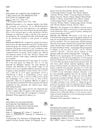 January 2024 in “The Journal of Dermatology”
January 2024 in “The Journal of Dermatology” Taking finasteride every other month can still help with hair loss but may be less effective over time compared to taking it daily.
 8 citations,
July 2017 in “The Journal of Steroid Biochemistry and Molecular Biology”
8 citations,
July 2017 in “The Journal of Steroid Biochemistry and Molecular Biology” DHT affects testicular development and regulates spermatogenesis in some fish.
57 citations,
April 2009 in “The Journal of Steroid Biochemistry and Molecular Biology” Steroidogenesis inhibitors change but don't stop androgen production in prostate cancer.
 January 2018 in “Journal of translational science”
January 2018 in “Journal of translational science” Eating alfalfa sprouts every day can raise testosterone levels in middle-aged men, but broccoli sprouts don't have this effect.
January 2022 in “Journal of Cosmetics, Dermatological Sciences and Applications” The serum increased hair density and was well-tolerated, but didn't affect hair thickness or shedding.
November 2011 in “InTech eBooks” Prostate cancer risk is not linked to blood testosterone levels.
123 citations,
December 1997 in “Calcified Tissue International” Higher androgen levels and site-specific AR expression cause sex-related skeletal differences, and certain steroids can boost AR expression and androgen effects in bone cells.
 May 1999 in “Drugs & Therapy Perspectives”
May 1999 in “Drugs & Therapy Perspectives” Finasteride helps increase or maintain hair in most men but can cause sexual side effects and should not be used by women, especially during pregnancy.
 4 citations,
June 2017 in “Endocrine Reviews”
4 citations,
June 2017 in “Endocrine Reviews” Dihydrotestosterone (DHT) mainly affects nearby cells, doesn't significantly change prostate hormonal environment or cancer risk, and doesn't play a main role in causing hair loss or acne. More research is needed on its effects on heart health, sexual function, and bone health.
The oral testosterone effectively increased testosterone levels and reduced SHBG, showing promise for treating testosterone deficiency.
 54 citations,
February 1993 in “Endocrine reviews”
54 citations,
February 1993 in “Endocrine reviews” Androgen conjugates might be better indicators of skin sensitivity to hormones in women with excessive hair growth.
 February 2024 in “Experimental Dermatology”
February 2024 in “Experimental Dermatology” IGFBP-rP1 could be a new treatment for a common type of hair loss.
10 citations,
October 2012 in “Andrology” Prostate cancer can progress even with low testosterone due to internal hormone production in the tumor.
 April 2022 in “Diabetes Therapy”
April 2022 in “Diabetes Therapy” Low testosterone does not prevent prostate cancer in men with type 1 diabetes.
2 citations,
August 2022 in “Middle East Fertility Society Journal” The new rodent model successfully mimics non-lean human PCOS symptoms.
 September 2008 in “Fertility and Sterility”
September 2008 in “Fertility and Sterility” Free fatty acids may increase androgen production, potentially contributing to polycystic ovary syndrome.
 2 citations,
September 2008 in “Fertility and Sterility”
2 citations,
September 2008 in “Fertility and Sterility” Clinical signs of excess male hormones and actual hormone levels in the blood do not always match in women with polycystic ovary syndrome.
 June 2018 in “The Journal of Sexual Medicine”
June 2018 in “The Journal of Sexual Medicine” Finasteride does not negatively affect male reproductive function.
 January 2023 in “Journal of men's health”
January 2023 in “Journal of men's health” Higher dihydrotestosterone may be linked to more inflammation in COVID-19 patients with low testosterone.
August 2019 in “Chin J Naut Med & Hyperbar Med” Hyperbaric oxygen therapy improves hair growth and quality of life in androgenic alopecia patients.
 June 2024 in “Journal of Cosmetic Dermatology”
June 2024 in “Journal of Cosmetic Dermatology” Higher homocysteine levels may inhibit hair growth and are linked to androgenetic alopecia.
 2 citations,
March 2017 in “Canadian Urological Association journal”
2 citations,
March 2017 in “Canadian Urological Association journal” Clomiphene citrate improves fertility in men taking finasteride for hair loss.
 February 2024 in “The Journal of Sexual Medicine”
February 2024 in “The Journal of Sexual Medicine” 5-α reductase inhibitors do not significantly affect male reproductive function but may reduce semen volume.
 118 citations,
September 2004 in “Clinics in Dermatology”
118 citations,
September 2004 in “Clinics in Dermatology” Hormones, especially androgens, play a big role in acne, but most acne sufferers don't have a hormone disorder. Hormonal treatments, including birth control pills, can be very effective for women whose acne doesn't improve with regular treatments.
 30 citations,
August 1992 in “The Journal of Clinical Endocrinology and Metabolism”
30 citations,
August 1992 in “The Journal of Clinical Endocrinology and Metabolism” Finasteride doesn't affect hormone levels in normal men.
 29 citations,
February 2007 in “Hormone and metabolic research”
29 citations,
February 2007 in “Hormone and metabolic research” Blocking the androgen receptor in skin cells reduces their growth response to male hormones, suggesting a possible treatment for skin conditions linked to androgens.
 506 citations,
March 2005 in “The Journal of Clinical Endocrinology and Metabolism”
506 citations,
March 2005 in “The Journal of Clinical Endocrinology and Metabolism” Testosterone therapy improves physical function, strength, and body composition in older men with low testosterone levels.
18 citations,
November 1998 in “Comparative biochemistry and physiology. Part A, Molecular & integrative physiology” Changes in prolactin and DHEA levels are not required for the start of mink hair growth cycles.
 3 citations,
January 2022 in “Precision medicine and clinical omics”
3 citations,
January 2022 in “Precision medicine and clinical omics” Beta-sitosterol and stigmasterol might help prevent hair loss by blocking a specific enzyme.
 211 citations,
November 1990 in “The Journal of Steroid Biochemistry and Molecular Biology”
211 citations,
November 1990 in “The Journal of Steroid Biochemistry and Molecular Biology” Finasteride effectively treats BPH, but needs more trials to understand potential.




















